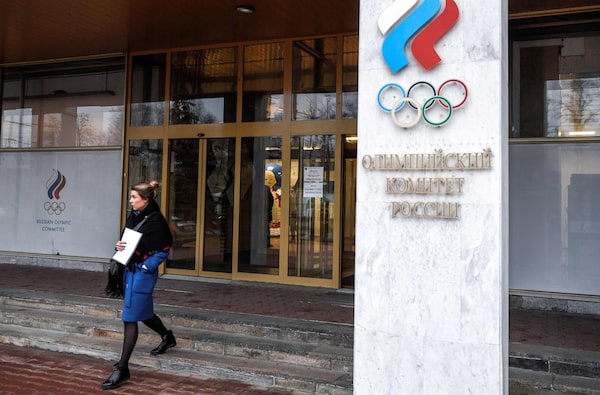
A woman walks out of the Russian Olympic Committee headquarters in Moscow on Dec. 24, 2019 following meetings with the Russian anti-doping agency to discuss the country's ban from major sport competitions.ALEXANDER NEMENOV/AFP/Getty Images
Russia’s four-year Olympic ban for manipulating doping data is heading to sport’s highest court.
The World Anti-Doping Agency said Thursday it has formally referred the case to the Court of Arbitration for Sport after Russia confirmed last month it will appeal the sanction.
WADA imposed a package of sanctions including banning Russia’s name and flag from the Olympics and world championship events in various sports over four years.
There are also restrictions on Russia hosting some major events, and plans to vet Russian athletes who want to compete at major competitions, barring them if they’re implicated in doping cover-ups.
The next stage is for WADA and Russia to each select one of the three CAS arbitrators to hear the case. Those two then select a third judge to lead the panel.
Next year’s Olympics in Tokyo will be the third consecutive edition of the games preceded by a legal battle over Russian doping issues.
Russia is set to be represented by at least three legal teams in what promises to be a complicated case. Besides the Russian anti-doping agency, which is the body officially sanctioned by WADA, the Russian Olympic Committee and the Russian Paralympic Committee have said they want to be represented.
“We’re hoping for an honest and fair ruling in relation to those issues we disagree with,” ROC president Stanislav Pozdnyakov said earlier Thursday, before the case was confirmed, in comments to state news agency Tass.
WADA’s sanctions are “excessive and in most cases illogical,” Pozdnyakov said.
Russia handed over the Moscow lab’s doping data archive in January in return for having earlier sanctions lifted in 2018.
WADA investigators found evidence that Russia was intensively editing the data in the weeks before the handover to remove signs of failed drug tests.
Russian officials have denied any editing took place and offered various explanations. That includes blaming the supposedly unstable structure of the database program for changing the file structure, and alleged interference by former lab director Grigory Rodchenkov, now WADA’s star witness on Russian doping.
WADA says that a concerted attempt was made to frame Rodchenkov by splicing fake chat messages into the database files.